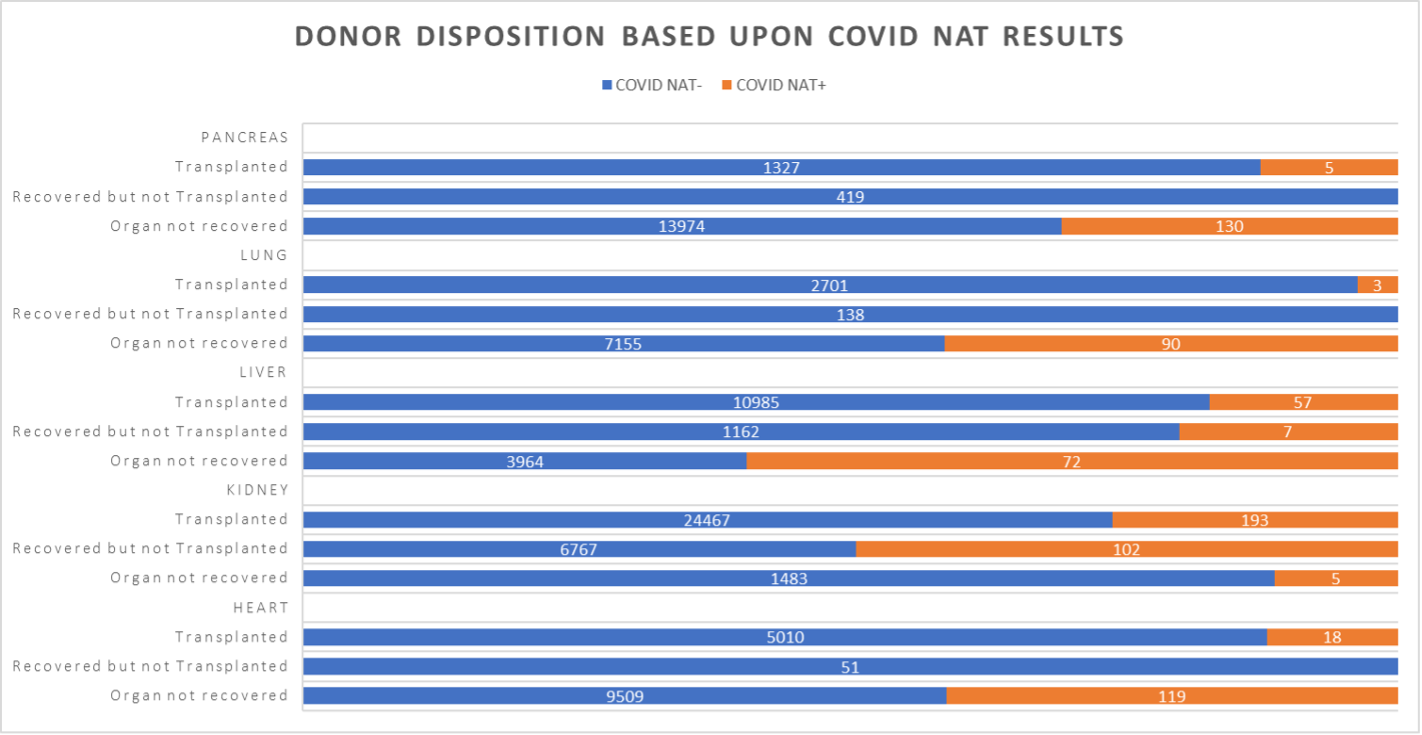Utilization and Discard of Organs from Covid -19 Infected Donors: A Us National Registry Analysis
A. Azhar1, I. Moinuddin1, A. B. Gungor2, M. K. Morales1, M. Z. Molnar3, B. Tanriover2, G. Gupta1
1Virginia Commonwealth University, Richmond, VA, 2University of Arizona, Tuscon, AZ, 3University of Utah, Salt Lake City, UT
Meeting: 2022 American Transplant Congress
Abstract number: 158
Topic: Clinical Science » Infection Disease » 24 - All Infections (Excluding Kidney & Viral Hepatitis)
Session Information
Session Name: COVID-19 Infections Part 1: All Organs
Session Type: Rapid Fire Oral Abstract
Date: Sunday, June 5, 2022
Session Time: 5:30pm-7:00pm
 Presentation Time: 5:30pm-5:40pm
Presentation Time: 5:30pm-5:40pm
Location: Hynes Ballroom B
*Purpose: Expansion of the donor pool remains a major unmet need for solid organ transplants (SOT). Early data suggests that at least some severe acute respiratory syndrome coronavirus 2 (SARS-CoV-2) (COVID) nucleic acid test positive (NAT+) organs could be transplanted safely although there is substantial controversy about this topic.
*Methods: A retrospective analysis of the national United States Organ Procurement and Transplantation Network database was performed, demonstrating initial experience with COVID NAT+ deceased donor organs with a focus on kidney transplants, from August 8, 2020, to Sep 29, 2021.
*Results: During this time period, 17,143 COVID NAT negative (NAT-) deceased donors and 150 COVID NAT+ deceased donors were assessed for organ donation (Figure 1) (Table 1). When compared to COVID NAT- donors, there was a higher (p<0.001 for all) non-recovery rate for COVID NAT+ hearts (35% vs 87%), lungs (71% vs 99%), livers (24% vs 53%), and pancreas (89% vs 98 %). Of a total of 385 recovered organs from 150 COVID NAT+ donors, 276 (72%) organs were transplanted into 262 recipients. Majority of donors had a COVID NAT+ ≤7 days prior to procurement (94; 62.7%). While only a minority of pancreases, hearts, lungs, and livers were procured, almost all were transplanted post-procurement. In contrast, there was a high discard rate for kidneys post-procurement (102/295; 34.6%) with the most common reason (~70%) for discards being ‘exhaustion of the wait list’. Presumably superior quality COVID NAT+ kidneys were discarded compared with COVID NAT- kidneys (mean KDPI: 67% vs 76%; p=0.04). Limited outcome data was available with a median post-transplant follow-up of 75 days (range: 23-243 days). Three kidney allograft losses (2 due to allograft thrombosis) and five deaths (2 kidneys, 3 livers) were reported, of which, one was due to respiratory failure and one due to sepsis.
*Conclusions: These data provide early reassuring evidence on the utilization of non-lung COVID NAT+ organs. However, a substantially lower procurement rate for non-kidney transplantable organs and a high discard rate for kidneys were noted.
| Positive COVID NAT Result- n (%) | 150 (100) |
| COVID NAT test site- n (%) Lower respiratory Upper respiratory Rectal |
13 (8) 136 (91) 1 (1) |
| Age (years) – mean (SD) Sex (male) – n (%) BMI (kg/m2)-mean (SD) Caucasian Race- n (%) Kidney Donor Profile Index – mean (SD, %) Terminal Creatinine (mg/dl)-median (IQR) |
43 (14) 98 (65) 32 (9.5) 91 (61) 48 (27) 0.89 (0.53, 1.5) |
| Pulmonary Infection-n (%) Chest X-ray-n(%) Normal Abnormalleft Abnormal right Abnormal both |
74 (49) 13 (10) 9 (7) 9 (7) 96 (76) |
| Cause of death -n (%) Anoxia Stroke Other |
48 (32) 33 (22) 69 (46) |
| Right kidney reason for discard, n (%) Donor’s medical history Biopsy finding Poor organ function No recipient located list exhausted Unknown |
1 (2.5) 3 (7.5) 2 (5) 27 (67.5) 7 (17.5) |
| Left kidney reason for discard, n (%) Biopsy finding Poor organ function No recipient locatedlist exhausted Unknown |
3 (8) 1 (3) 27 (73) 6 (16) |
| Double kidneys reason for discard, n (%) No recipient located list exhausted Unknown |
4 (80) 1 (20) |
To cite this abstract in AMA style:
Azhar A, Moinuddin I, Gungor AB, Morales MK, Molnar MZ, Tanriover B, Gupta G. Utilization and Discard of Organs from Covid -19 Infected Donors: A Us National Registry Analysis [abstract]. Am J Transplant. 2022; 22 (suppl 3). https://atcmeetingabstracts.com/abstract/utilization-and-discard-of-organs-from-covid-19-infected-donors-a-us-national-registry-analysis/. Accessed March 1, 2026.« Back to 2022 American Transplant Congress

